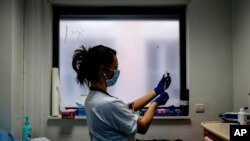The city of Orlando, Florida has asked its residents to cut back on its use of water for several weeks because of a shortage of liquid oxygen, which is used to purify the water supply. The oxygen shortage is another consequence of the COVID-19 pandemic. COVID-19 patients need the oxygen to help them breathe and the demand for it is high.
The city uses the oxygen in the drinking water supply to stop discoloration and a rotten-egg smell.
The Orlando Sentinel newspaper reports on its website that the city has already stopped watering its parks and ballfields to conserve water.
The Orlando Utilities Commission usually receives 10 weekly tanker truck deliveries of oxygen, but deliveries have now been reduced to five to seven.
Orlando Mayor Buddy Dyer asked residents to stop washing their cars, watering their lawns, and using pressure washers for two to three weeks.
In Australia, police clashed with COVID-19 lockdown protesters in the city of Melbourne Saturday. Police say more than 4,000 people attended the demonstration. Six police officers were taken to the hospital for injuries and more than 200 protesters were arrested. A much smaller protest was held in Sydney, drawing about 250 demonstrators, according to the Sydney Morning Herald. Forty-seven people were arrested at the Sydney rally.
Authorities in India have approved emergency use of a second locally developed vaccine, while British drugmaker AstraZeneca unveiled a new antibody therapy to fight COVID-19.
India’s latest vaccine, developed by Indian pharmaceutical firm Zydus Cadila, is the world's first DNA-based inoculation against the coronavirus. The vaccine uses a section of genetic material from the virus to instruct cells to make a specific protein to which the immune system can respond.
The three-dose vaccine has been approved for use in adults as well as children 12 and older. It is the sixth vaccine to be approved in India, including another locally developed vaccine by Indian firm Bharat Biotech.
Also Friday, drugmaker AstraZeneca released data from a late-stage trial for a new antibody therapy, showing it reduced the risk of people developing any COVID-19 symptoms by 77%. The company said the therapy can be used preventatively and could be particularly helpful to people who respond poorly to immunization shots. It said that 75% of the participants in the trial had chronic conditions, including some with a lower immune response to vaccinations.
In South Africa, officials opened vaccine eligibility to all adults as they sought to protect the population from a surge fueled by the highly contagious delta variant.
Sri Lanka began a 10-day lockdown on Friday in an effort to limit the spread of the coronavirus. The nation recorded its highest single-day COVID-19 death toll of 187 on Wednesday.
In Israel, Prime Minister Naftali Bennett received a third shot of the Pfizer-BioNtech COVID-19 vaccine on Friday, as the country began administering additional shots to people ages 40 and older to combat an increase in coronavirus infections.
The United States on Friday extended the closure of its land borders with Canada and Mexico for nonessential travel through September 21. The move comes despite Canada’s decision to open its border to vaccinated Americans.
Officials in San Francisco Friday began a program of requiring proof of full vaccination against the coronavirus before entering indoor restaurants, gyms and concert halls. The city is the first major U.S. metropolitan area to require full vaccination at such venues and goes further than a New York rule, which requires people to be at least partially vaccinated to attend many indoor activities.
Some information for this report came from The Associated Press, Agence France-Presse and Reuters.





